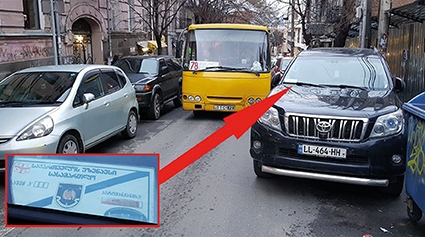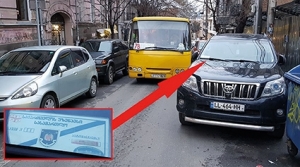Standing Together Or Falling Apart
Illegal and anti-social behavior by an SUV belonging to Georgia Supreme Court, February 15, 2019. The vehicle is parked in a manner blocking Belinski street, just above the Rooms hotel. The yellow bus and all the cars behind had to wait for more than 30 minutes for the road to be unblocked.
I remember the very first day I entered Tbilisi State University’s 1st Building (‘Corpusi’). ISET’s only class was located on the second floor, at the end of a long and angled corridor. Strolling along, I heard the sound of music (which was still very new to my ears) coming from beyond the corner. And when I finally got around the corner, I saw a whole bunch of them, Jege Sakhokia, Gaga Abashidze, Levan Karsaulidze and a few other ISET guys, standing in a semi-circle, hugging each other, and singing. This image of togetherness and friendship stuck with me for many years to come, symbolizing, as it does, Georgia’s unique history, the ability of its people to survive through the many centuries of division, conquest and submission to much larger foreign powers.
SPACES, PRIVATE AND PUBLIC: A SHARP DIVIDE.
The year was 2007, Ania and I had just moved to Tbilisi with our two little kids, and before anything else we had to find a place to live, an apartment. The real estate agent we hired recommended we look in Vake, close to the park. And so, a few days after landing, we started schlepping ourselves from one ugly post-Soviet apartment block to another.
Stuck like giant wedges between red brick buildings of the previous eras, some of these monstrosities had a peculiar inverted pyramid shape. Rising from a relatively narrow base (limited by the amount of land available for construction), they expanded upwards, defying (selectively enforced) construction regulations, and ominously hanging over passers-by. Smelly and poorly-lit entryways were totally uninviting, but we took our chances to inspect what was on offer in Tbilisi’s bustling real estate market of 2007.
The inside of the private apartments we were shown sharply contrasted with the filthy and dark entryways, staircases and other public spaces of the buildings. Though not always furnished to our taste, most apartments sported enormous living rooms, often featuring grand pianos (I vividly remember a white one), crystal chandeliers, and antique-style seating. And – lo and behold! – they were extremely well taken care of: freshly painted, clean, and beautifully lit.
* * *
It is quite natural for people to distinguish between their private habitat – the space in their immediate environment (which they often own and control), and the public space outside. Yet, the borderline between the private and public spheres may be characterized by very different gradients.
In most cultures I am familiar with, people would not toss cigarette butts in the public space just outside their houses. Shopkeepers and neighbors would venture at least a little outside their private territory when shoveling snow or sweeping the street.
Nowhere have I seen as sharp a divide between what is ‘my territory’ and what is ‘no man’s land’ as in these Georgian apartment blocks. Nowhere have I seen the private-public border drawn right at the doorstep of one’s house. Nowhere have I seen such a contrast between the luxury inside and the filth just one step outside one’s abode.
THE CHALLENGE OF GOING UP.
Another paradoxical aspect of living in a 2007 Georgian apartment block concerned the operation of elevators. In many of the buildings we visited, elevators were equipped with ironclad slot machines operated by 10 Tetri coins. To our astonishment, to go up we had to drop a coin (going down was free!)
As explained to us, these slot machines were in fact proof of the market’s ingenuity in addressing people’s failure to cooperate.
With the disappearance of government in the early years of independence, Georgian citizens had to start managing their own affairs, which until then have been paternalistically taken care of by the Soviet authorities. Unfortunately, but understandably, self-government – even at the level of a single apartment block – turned out to be extremely difficult to organize. Cooperation broke down because those living on the lower floors did not want to pay as much as the guys above them (or not at all). As a result, people ensconced in their private spaces, letting everything public get into a state of decay and disrepair.
The market resolved the elevator maintenance problem. Popping up in response to ‘latent’ demand for their services, private sector companies offered an innovative and economically efficient solution: the slot machine. Just like toll roads, paid elevators offer you a choice: pay to save time and effort or sweat all the way up.
Many other common governance issues are still awaiting their resolution.
POLITICS STARTS AT THE GRASSROOTS LEVEL.
Politics (democratic or not) start at the grassroots. We got used to thinking that grassroots democracy is about the strength of (donor-financed) civil society organizations. But politics and collective governance starts right inside the buildings we share with our neighbors. Every time we have to drop a coin in the elevator’s slot machine, we are exposed to a political governance problem. Yes, a coin-operated elevator performs its function (unless you run out of your 10 Tetri coin supply), but a far more civilized solution, one that is implemented all over the world, is to have all tenants contribute to a common pool of money that can be used for all common needs: cleaning, lighting, greening, minor repairs, and … elevator maintenance.
For Georgians, coming to an agreement on how much each family should contribute to this common pool of money remains an elusive dream. Metaphorically speaking, those living on the lower floors of Georgian society don’t want to pay for elevator maintenance or fixing a leaking roof. Those belonging in the top drawer find their own ways to freeride on their neighbors. As a result, we all live in dirty, dark and energy-inefficient buildings, with elevators operated by coins. A classical tragedy of the commons.
Governing cooperation, which is what politics is all about, is a difficult endeavor, at all levels. When freeriding is not punished, people tend to shirk from their social duties, and cooperation breaks down, leading to chaos and social turmoil.
To survive over the centuries, communities all over the world developed social norms, religious rites and formal laws to allow for collective governance and enforce fragile cooperative arrangements.
• “You shall not covet your neighbor's house” (or his wife) is probably one of the earliest examples of a religious “commandment” designed to contain anti-social behavior among community members.
• Georgia is rich in its own collective governance traditions. In high mountainous regions, such as Tusheti, villagers established sacred forest zones above their settlements to prevent deforestation and landslides. For similar reasons, high mountain communities adopted unwritten laws to allocate pasture (at different altitudes) to different types of animals. Finally, Georgian supra and musical traditions are all about harmony and cooperation.
• Finally, modern day legal systems are all about enforcing cooperative behavior: keeping one’s word and contractual obligations, driving within acceptable speed limits, or not using violence in one’s dealings with others.
Norms and laws are there to nudge (or force) people into pro-social behavior and cooperation, be it about homeowners’ association rules, traffic regulations, criminal and civil codes.
Now, if Georgians fail to cooperate and behave in a pro-social manner, it is not because they are genetically programmed egoists. Georgian citizens fail to cooperate because there is no legal framework to underpin their cooperation. This is why Georgians continue littering in common areas (and the common ‘environment’) and do not contribute enough to common causes. By the same token, the fact that a vehicle belonging to Georgia’s Supreme Court can get away with blocking traffic on a busy street has nothing to with the country’s ancient traditions or culture. It is a consequence of a weak legal and institutional framework governing today’s Georgian politics and justice system.
Historically, communities that failed to develop and enforce pro-social norms simply perished. They fell prey to better-organized enemies, overgrazing, floods and deforestation. The Georgian people are not genetically programmed to live in dirty condominiums, poorly lit or littered streets: they simply have to get better organized and make better collective choices. Easier said than done, of course.
About the author:
Eric Livny is Founder and President at Tbilinomics Policy Advisors and Chair of Economic Policy Committee at the International Chamber of Commerce (ICC Georgia).
By Eric Livny











